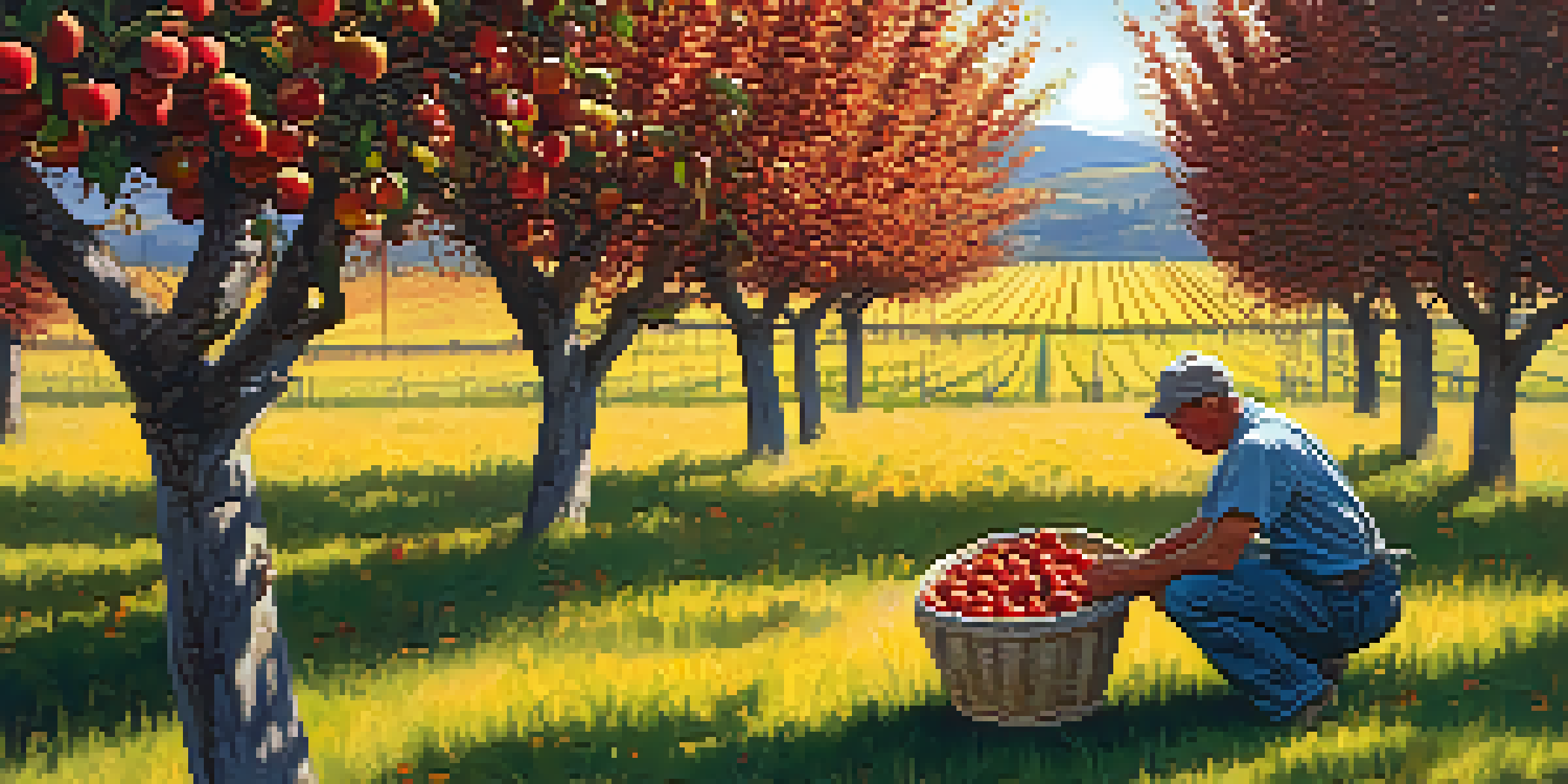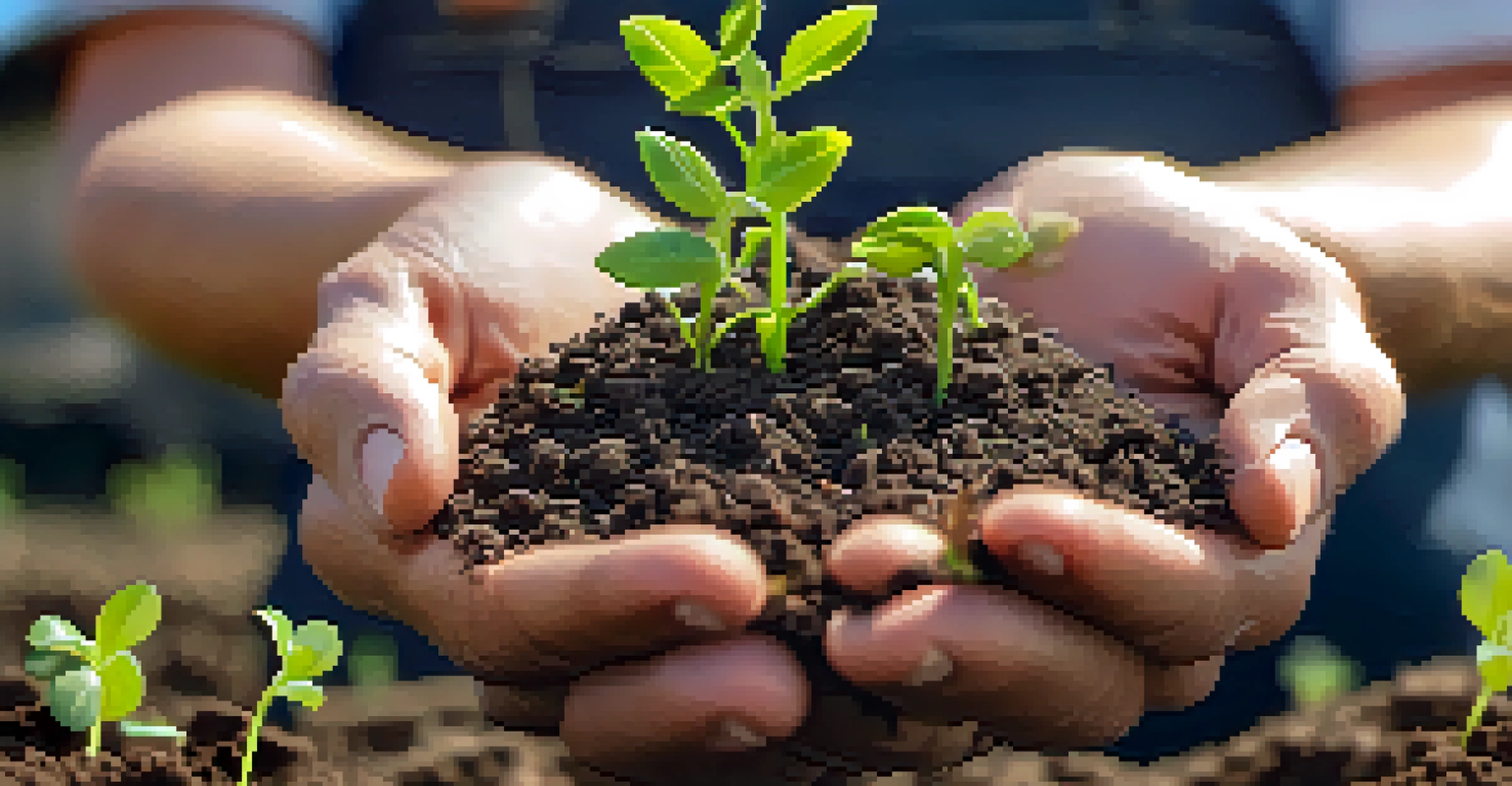Agriculture's Impact on Washington State's Economy Overview

Introduction to Agriculture in Washington State
Washington State is renowned for its diverse agricultural landscape, which plays a pivotal role in the local economy. With its rich soil and favorable climate, the state produces a wide variety of crops and livestock, making it one of the leading agricultural states in the U.S. From apples to wine grapes, the agriculture sector is not just about farming; it's a vital economic engine that supports many communities.
Agriculture is the most healthful, most useful and most noble employment of man.
In fact, agriculture contributes billions to Washington's economy, influencing everything from job creation to international trade. The industry also encompasses food processing, packaging, and distribution, which further amplifies its economic impact. This interconnected web of activities reflects the importance of agriculture beyond mere crop production.
As we explore the nuances of agriculture's impact, it's essential to recognize how it shapes the state's identity and sustains livelihoods. The agricultural sector is not only a backbone of the economy but also a cultural touchstone that connects residents to their land and heritage.
Economic Contributions of Agriculture
Agriculture is a significant contributor to Washington's GDP, with farm gate sales exceeding $10 billion annually. This figure represents the value of crops and livestock sold, which showcases the sector's capacity to generate wealth. Moreover, when you consider related industries, such as food processing and transportation, the total economic impact grows even larger.

The state's agricultural diversity means that various crops contribute differently to the economy. For example, Washington is the leading producer of apples in the nation, and this single crop alone brings substantial revenue. Additionally, the thriving wine industry has put Washington on the map as a premier wine-producing region, attracting tourism and investment.
Agriculture Fuels Washington's Economy
The agricultural sector significantly contributes over $10 billion annually to Washington's GDP, showcasing its importance as a financial pillar.
These contributions illustrate how agriculture serves as a vital financial pillar for the state. By fostering innovation and supporting rural communities, the agricultural sector not only sustains itself but also promotes broader economic growth.
Job Creation in the Agricultural Sector
One of the most significant impacts of agriculture in Washington is job creation. The industry employs thousands of workers, ranging from farmers and laborers to food scientists and agronomists. Many rural communities rely heavily on agricultural jobs, which are crucial for their economic stability and growth.
The future of agriculture is in sustainability, and the creativity of farmers will lead the way.
Moreover, agriculture supports ancillary industries, including transportation, logistics, and retail. For every agricultural job, there are often multiple supporting roles that help bring products from farm to table. This creates a ripple effect that bolsters the job market in both urban and rural areas.
The importance of job creation in agriculture cannot be overstated. It provides a stable income for families and contributes to the overall health of the economy, ensuring that communities thrive and develop sustainably.
Agriculture's Role in Exports
Washington State is a powerhouse when it comes to agricultural exports, with products shipped to more than 70 countries. The state's abundant resources and diverse crop production make it a key player in the global market. Top exports include apples, wheat, and wine, all of which highlight the state's agricultural prowess.
These exports not only generate substantial revenue but also foster international relationships and trade agreements. As Washington's agricultural products gain recognition abroad, they enhance the state's reputation as a high-quality producer. This contributes to a favorable balance of trade and strengthens the overall economy.
Job Creation in Agriculture
Agriculture provides thousands of jobs in Washington, supporting both rural and urban communities through a ripple effect in related industries.
Furthermore, the growth of agricultural exports has implications for local farmers, who benefit from increased demand. This not only boosts their income but also provides them with opportunities to innovate and expand their operations.
Sustainability Practices in Agriculture
In recent years, sustainability has become a significant focus within Washington's agricultural sector. Farmers are increasingly adopting practices that minimize environmental impact while maximizing productivity. This shift not only benefits the planet but also appeals to consumers who prioritize sustainability in their purchasing decisions.
Techniques such as crop rotation, organic farming, and water conservation are just a few examples of how farmers are working towards a more sustainable future. By embracing these practices, they are not only safeguarding their land and resources but also ensuring their economic viability for generations to come.
Sustainable agriculture can also enhance marketability, as products that are grown with care often command higher prices. This dual benefit reinforces the idea that environmental responsibility and economic success can go hand in hand.
Challenges Facing Washington's Agriculture
Despite its many advantages, Washington's agricultural sector faces several challenges that threaten its stability. Climate change, for instance, poses significant risks, as shifting weather patterns can disrupt crop yields and affect livestock health. Farmers must adapt to these changes to maintain productivity and profitability.
Additionally, competition from both domestic and international markets can exert pressure on local farmers. With emerging agricultural markets and changing consumer preferences, Washington farmers must innovate and differentiate their products to stay competitive. This often requires investment in technology and marketing strategies.
Focus on Sustainable Practices
Farmers in Washington are increasingly adopting sustainable practices that not only protect the environment but also enhance their market competitiveness.
Moreover, labor shortages have become a pressing issue. Many agricultural jobs are seasonal and require a reliable workforce, which has been increasingly difficult to secure. Addressing these challenges is crucial for ensuring the future resilience of Washington's agricultural economy.
The Future of Agriculture in Washington State
Looking ahead, the future of agriculture in Washington State is both promising and complex. Advances in technology, such as precision agriculture and sustainable farming methods, are helping farmers increase efficiency and reduce waste. These innovations hold the potential to revolutionize how agriculture is practiced and enhance economic outcomes.
Moreover, as consumers continue to demand locally sourced and sustainable products, Washington farmers are in a prime position to meet these needs. By leveraging their reputation for quality and innovation, they can tap into growing markets both locally and internationally.

Ultimately, the path forward will require collaboration among farmers, policymakers, and consumers. By working together to overcome challenges and seize opportunities, Washington's agricultural sector can continue to thrive and remain a cornerstone of the state's economy.